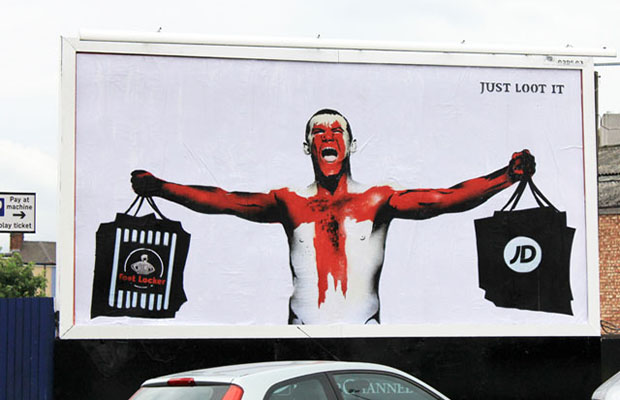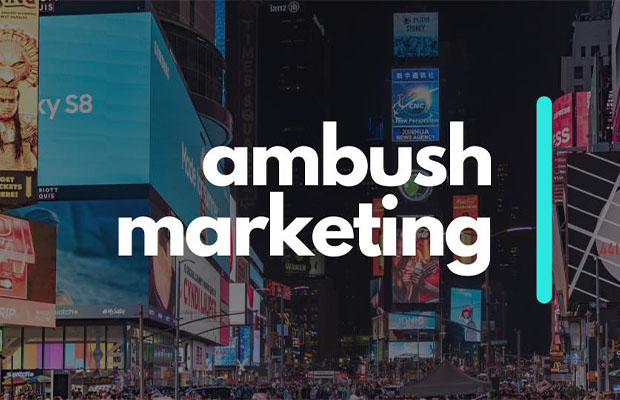Ambush marketing is a great illustration of a contentious strategy that frequently produces positive results in the world of advertising. You can use the creative ideas in this post to come up with new strategies for your current advertisements.
But first, what is ambush marketing? Ambush marketing is a strategy that involves a brand team trying to associate their products or services with a big event that already has official companies-sponsors.
The majority of the time, it takes place during sporting events and aims to increase brand awareness for a specific business without sponsorship rights.
Here’s a closer look at what it’s all about, what the benefits and drawbacks are, and whether it might work for your business’s upcoming marketing campaign.
Table of Contents
What is Ambush Marketing?
Ambush marketing, also known as coat-tail marketing or predatory ambushing, is the practice of appropriating or hijacking another advertiser’s campaign to promote another business or brand, frequently in the context of event sponsorships.
The acrimonious dispute between MasterCard and Visa that broke out during the 1992 Winter Olympics, which were held in the town of Albertville in southeast France, is one of the earliest instances of ambush marketing that is known.
The official credit card sponsor of the ’92 Winter Games was Visa, which paid $20 million (roughly $35.5 million in 2018 dollars) for the honor. For months prior to games, Visa ran TV commercials advising American Express cardholders to leave their AmEx at home as “the American Express is not accepted at the Olympics.”
Read More: Franchise Advertising
How Does Ambush Marketing Work?
A company can effectively steal attention from competitors by using the ambush marketing technique. When a business waits in a covert position to capitalize on the attention of others, it is utilizing marketing strategy.
Imagine that your company wants to use major events like the World Cup or something to promote your brand, but the budget for the company simply does not allow it. What would you do to take advantage of that exposure? You’ll have an ambush marketing plan in mind that will help your brand while saving you money on the rights your rival paid for in order to be an official sponsor.
When Heineken paid and made an effort to be the official beer sponsor of the 2011 US Open, Stella, for instance, used ambush marketing to steal the limelight from Heineken. This time, they plastered their advertisements throughout the nearby train station.
You May Also Like: Persuasive Ads Guide
Why Do Businesses Use Ambush?
The main objective of most ambush campaigns is to link their organization to the notoriety of a particular event without entering into a sponsorship agreement. Ambush marketing offers a unique strategy for designing a marketing campaign while also allowing for complete creative freedom and flexibility.
To respond to marketing campaigns created by the official sponsors of an event, brands use a variety of visual formats and wordplay. Such campaigns are extremely entertaining, so they are more likely to draw in a large audience and stick in people’s minds.
With this tactic, businesses frequently use techniques that fall outside the bounds of a brand’s set standards. You can use ambush marketing in a variety of ways, from PPC ads in search results to enormous billboards on the busiest city streets.
It’s time to find out if using ambush marketing is legal now that you are aware of some of the advantages your brand can experience after doing so.
Read More: Which Is A Key Benefit Of Bumper Ads?
Is Ambush Marketing Legal?
Companies may engage in illegal activities, such as infringement of the event owner’s trademarks, copyright, and other rights, by utilizing this marketing strategy improperly. However, if done correctly, it can bring your company a number of advantages, as some well-known brands have demonstrated.
When developing an ambush marketing campaign without any official right to use an event for your promotion, don’t:
- use actual names, logos, slogans, or branding of events;
- mention words “Sponsor”, “Partner” or “Supporter” concerning this event;
- conduct giveaways and give people tickets to the event.
Numerous actions are taken in this industry to combat this marketing tactic because it is popular in sports. Major sporting events use these policies to safeguard their organizers’ intellectual property rights and exclusive sponsorship deals. As a result, these laws may restrict free speech and prevent companies from using a particular event to promote their brands.

To successfully and legally use this innovative marketing strategy without infringing on any rights, it’s imperative to take certain precautions. Let’s examine the advantages and disadvantages of ambush marketing if you are thinking about using it for your upcoming marketing campaign.
Advantages and Disadvantages of Ambush Marketing
Ambush advertising has benefits and drawbacks, just like any other marketing tactic. Let’s examine them more closely.
The advantages are as follows:
- cost-effectiveness;
- improved brand equity;
- freedom and flexibility;
- an opportunity for startups to jump-start their business;
- a higher competition that brings lower prices for consumers;
- a creative approach;
- a direct response to a campaign;
- various forms and sizes, starting from a mobile sidebar ad to huge billboards in a city center;
- companies can go off-script from their initial content, style, etc.
This strategy is no different from other marketing strategies in that it has drawbacks. It has the following disadvantages you should be aware of before implementing it:
- makes it difficult to calculate ROI;
- requires quick response and detailed planning;
- relies on time and space;
- violates the rights of actual sponsors and partners of an event;
- relies solely on competitors’ ads to address them.
Knowing the benefits and drawbacks will help you determine whether this marketing tactic is appropriate for your company. Determine which kind is best for your brand as the next step.
Types of Ambush Marketing
The strategy can be divided into two main types:
- Direct marketing;
- Indirect marketing.
In direct ambush marketing, a brand’s team aggressively uses various activities to associate themselves with an event without being a sponsor or partner. There are four types of direct marketing:
- Predatory ambushing is a technique that includes one brand attacking another (an official sponsor of an event), which prevents people from identifying an actual sponsor;
- Coattail ambushing is a strategy where a brand aims at gaining exposure by becoming a sponsor of a person who participates in the event;
- Property or trademark infringement is when a brand uses logos, symbols, or phrases of another brand to promote its services that often leads to confusion among customers and diminishes the marketing efforts of the property’s owner;
- Self-ambushing means that a brand has sponsorship rights but gets involved in activities not mentioned in the contract.
Let’s go over self-ambush in greater detail. A prime example is the circumstance surrounding the 2008 UEFA European Championship and Carlsberg. Official sponsor and well-known beer company did something that wasn’t covered by their sponsorship agreement. The company distributed free T-shirts and headbands during the competition.
Indirect ambush marketing doesn’t necessarily involve association with an event but rather tries to align a company through a suggestion or reference to it. This tactic does not involve a brand attacking another brand but instead gives you exposure.
Let’s move on to some examples now that that has been clarified.
Examples of Ambush Marketing
Ambush marketing is employed by many successful brands. To get some ideas, let’s take a look at some of them.
BMW and Audi
It might be difficult to believe, but ambush advertising is still used by powerful automakers like Audi and BMW, who enjoy the audience’s love and trust as well as great popularity and financial success. These major brands made billboards their battlefield. Audi saw an opportunity to promote itself by provoking BMW with billboard advertisements that featured witty slogans placed next to BMW’s billboard.
Paddy Power
My countrymen in Britain love a good wager, unlike our friends in the United States, many of whom seem to have an irrational, bordering on phobic aversion to a friendly wager. Take a stroll down a high street in the UK. and you’ll most likely see at least one or two bookmakers, among the best-known of which is Paddy Power is an Irish casino chain.
Paddy Power’s first foray into the thrilling world of predatory ambushing occurred during the Olympic Games, specifically the London 2012 Games, like so many of the most infamous ambush marketing campaigns.
Samsung and Apple
Fans of Apple will undoubtedly recall the 2011 launch of the new iPhone 4S. Samsung, Apple’s rival, decided to step in by constructing a pop-up store close to Apple’s storefront in Sydney because the device launch was one of the most anticipated events of the year.
To purchase a brand-new mobile device, people had to wait in a long line and pay a significant amount of money. At the same time, Samsung was selling its Galaxy SII for a good deal just a few feet away. Some people couldn’t say no to such a tempting offer and ended up taking a new Samsung instead of an Apple product home.
FAQs
How to Prevent Ambush Marketing?
Forward planning, proactive management and appropriate enforcement action by organisers of major sporting events can effectively combat “ambush marketing”.
Why is Ambush Marketing Important?
The majority of ambush attempts have a single purpose in mind: to associate their company with the fame of a specific event without having to sign a sponsorship contract. Ambush marketing develops a marketing campaign in a novel way while also allowing for total creative freedom and flexibility.
Final Words
There may not be any original ideas in the world, but there are always brilliant new ways to update or revisit old ones.
When done ethically and skillfully, ambush marketing is an excellent example of how that can work within a marketing context.
All but the wealthiest brands may find the costs involved to be prohibitively expensive, but the fundamental strategies of ambush marketing as a concept can be easily applied to your campaigns, from PPC campaigns on the search network to campaigns on Facebook that focus primarily on visual content.
Read More: Criminal Defense Advertising





